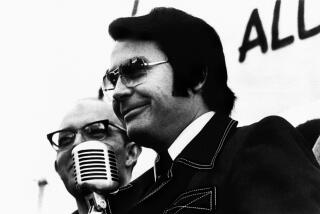Shine Light on the Dark Side of the Net
- Share via
Look what lies under the Internet rock. Oh dear, isn’t it weird? This time it was the World Church of the Creator Dot Com that inspired Benjamin Nathaniel Smith to a murderous campaign against all but his true-believing Netizen friends.
Once again we’re shocked into an awareness that the Internet is not always that bright new world of increased productivity, fun online shopping and get-rich-quick IPOs. It’s all that, but there’s also that inevitable dark side of freedom: nasty minds conspiring in hate.
As is most often the case with hate groups these days, there was no actual church or other headquarters, merely some Internet sites spewing a message of madness. Virtual headquarters, if you will, with innocuous names like creator.com and wcotc.com where the lonely and deranged are welcomed at all hours of the night. There was even a link to a kiddie page.
Even the hate seems virtual in the case of the 21-year-old Smith, the good student son of a doctor who benefited from the finest of homes and schools and entered college to study computer programming. This is the model citizen that we intend for the wired schools of the future to turn out, and in real life on the campus he seemed to move easily among the Jews, blacks and Asians who later became his targets.
The Web church’s avatar/minister/fuehrer, Matthew F. Hale, still lives the quiet suburban life in his retired policeman father’s home and, at 27, still passes as the ideal boy next door. But thanks to the Web, he found an outlet for his insane vision and built the fastest-growing white supremacist organization in the nation, with 41 outposts in 17 states.
Nothing special about that. Don’t blame the medium, we’re told. Ugly impulses existed even when the mass media were represented by smoke signals. “Mein Kampf” was, after all, a book, and proto-fascists in this country have managed to use old-fashioned radio to alarming effect.
Still, there is something fundamentally different about the nuttiness of the Internet, which lies in its fevered environment, uncontrolled and uncontrollable, where the mad festers alongside the rational. For one thing, this is the first form of mass media that operates totally without a moral, political or economic governor.
Also, for the first time, the cost of reaching a potentially mass audience is insignificant, so one does not even experience the regulatory effect of a market where presumably good products would drive out the bad. There is instead a babble of voices, and Net surfers will stumble as often on the odd as the expected. Government censorship wouldn’t work even if that was a commendable approach, which it isn’t. Suppress a Web site based in Idaho, and an even more fearsome inspiration will emerge in some other fatherland.
Smash it with a stick or let the evil snake die in the sun--the debate is as old as the tale of freedom, and the sensible answer always comes up the same: Better we should have exposure to the light of day than censorship. True enough, but the problem with the Internet is that so much of it that is evil remains obscured in the nooks and crannies of the Net’s existential underworld.
A few groups, like the Simon Wiesenthal Center, labor mightily to alert us to the danger, but their warnings have largely gone ignored in the self-congratulatory celebration of the Internet as a manifestation of unfettered freedom. There is almost no self-examination on the Internet, as if the very act of industry introspection is a betrayal of the essential spirit of the enterprise. Nor do the more conventional media of print and broadcast pay any attention to Internet content, focusing instead on the profit that is being made, often with the envy of those desperate to get into the game themselves.
Still, there must be a sense in those quarters that things cannot go on this way, that the whole of the Internet is being compromised by the slime that slithers through its parts. At some point, the corporate leaders in this industry will seek to clean up their act and sanitize the enterprise. But while restricting content may have public relations appeal, it’s not the answer.
Better to intensify the debate, not silence it. The Internet should remain un-policed, but it should not continue to careen through its too-often bizarrely reckless life unobserved.
Censorship of the Internet is neither desirable nor practical. But that doesn’t mean that it need remain an environment unedited and indeed unremarked upon by centers of reason. The cause of freedom is not served by allowing the lunatics to run the asylum.
More to Read
Sign up for Essential California
The most important California stories and recommendations in your inbox every morning.
You may occasionally receive promotional content from the Los Angeles Times.













